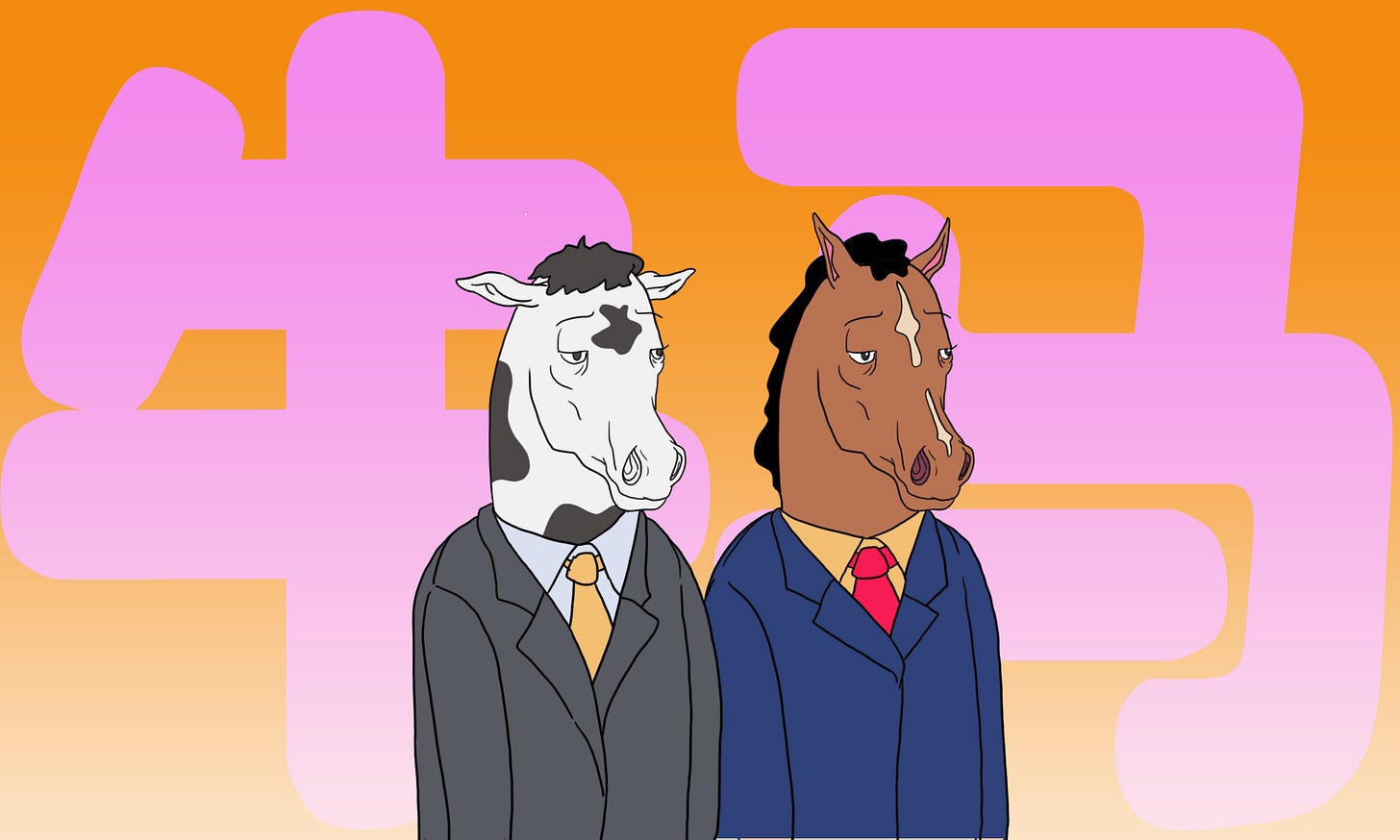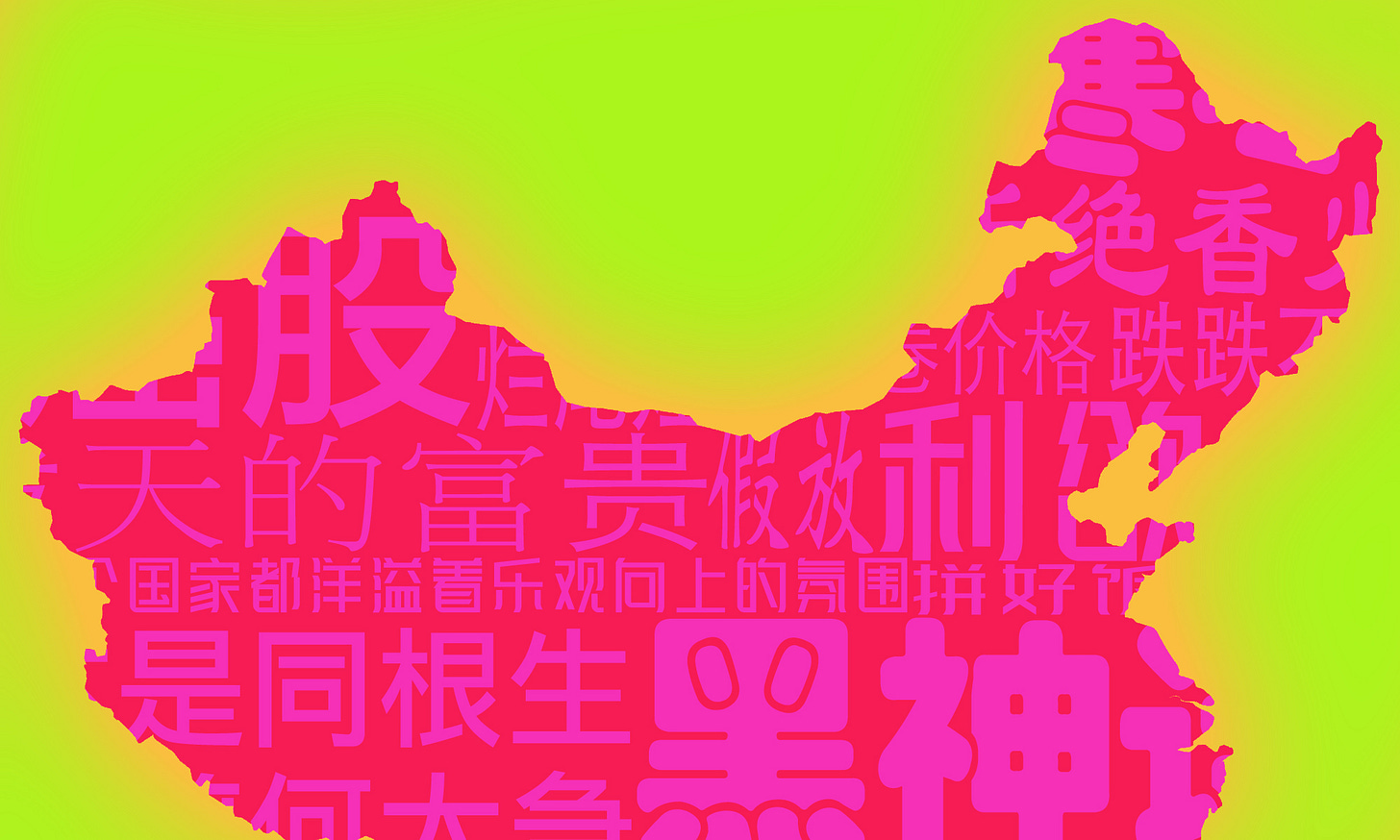Welcome to RealTime Mandarin—a multimedia resource to immerse you in the latest Chinese language trends, inspire you to practice and improve your Mandarin every week, and empower you to communicate with confidence.
Subscribe now to get the next issue straight to your inbox!
It’s an annual tradition in this newsletter to close out the year by reflecting on our favourite phrases from the past 12 months.
This year, we've followed some of the biggest stories in China, examining how they were discussed and the language—sometimes invented—that emerged to describe them.
In this edition, we highlight six key themes that stood out in discussions throughout 2024, announce our “Phrase of the Year,” and wrap up with 24 essential words and phrases you need to know to have up-to-date and relevant conversations in Mandarin this year.
1. Markets
The year kicked off with turmoil as China’s two biggest gaming companies lost nearly $80 billion in market value. Regulators proposed strict new rules on video game spending and rewards just before the new year, leaving investors feeling “a bird startled by the sound of a bow” (惊弓之鸟).
By February, the stock markets were in “continuous free-fall” (跌跌不休), with the Shanghai Composite Index down 8.2% in just two months. Frustrated investors turned to the U.S. embassy's Weibo account, which became known as a “Wailing Wall” (哭墙), with disgruntled investors using its blue VVIP status as cover to vent about China’s “cancerous A-shares” (癌股).
State media struck back, insisting that everything was actually great, and "the whole nation is filled with a sense of uplifting optimism" (整个国家都洋溢着乐观向上的氛围), but this only fuelled more online mockery and memes.
In September, a surprise move by the People's Bank of China (PBoC) sent A-shares soaring, with the Shanghai Composite Index gaining 21% in just five days. Investors rushed to ride the “frenzied bull market” (疯牛), fearing the “good times would not last” (好景不长).
2. Consumers
Northern city of Harbin shot to fame in January thanks to a wildly successful online marketing campaign. 3 million tourists poured into the city, bringing an “unexpected flood of wealth” (泼天的富贵).
2024 also saw the release of Black Myth: Wukong (黑神话:悟空), China’s most successful video game ever. Selling 10 million copies in just three days, it became the country’s first AAA title, with brands like Luckin Coffee (瑞幸咖啡) capitalising on its success through co-branding campaigns.
The game was so influential that “black myth” (黑神话) became a metaphor for “legendary success,” a label given to another consumer success we discussed this year, Pangdonglai 胖东来, a supermarket chain that thrived by staying small and becoming a destination in its own right.
But overall, consumer spending was down in 2024, prompting businesses to adapt. Food delivery giant, Meituan 美团, seized on this trend with its "group take-out" (拼好饭) service, allowing customers to save money by pooling their orders for takeout meals.
3. Food safety
In July, an investigative report by Beijing News (新京报) exposed how unwashed fuel tankers, used for transporting coal-derived oils and petrochemicals, were also being used to deliver cooking oils to cut transport costs. It was an “open secret” that “loopholes in regulations were being exploited” (钻空子) by profiteering logistics companies.
In October, another food safety scandal hit the headlines, when a private school in Yunnan, “blinded by their own greed” (利欲熏心), was found serving rotten meat to its students.
In both scandals, the phrase, “unprofessional team” (草台班子), was used to describe those responsible.
Our 2023 phrase of the year, “pointing at a rat and calling it a duck” (指鼠为鸭), made a comeback in these discussions too, becoming the defining phrase for food safety cover-ups.
4. Education
This year, a new phrase emerged: “unfinished kids” (烂尾娃), referring to children whose parents heavily invest in their education, but with disappointing results.
The phrase draws from one of last year's top phrases, “rotten end buildings” (烂尾楼), comparing failed building projects to children who are left “unfinished” by intensive, high pressure parenting.
Earlier in the year, reports showed a sharp decline in piano sales, with half of China’s piano factories closing. Once a symbol of wealth, the piano industry now faces cutbacks as families tighten their education budgets, leaving the sector “deserted” (门可罗雀).
Many young couples express their disillusionment with having children because of the high costs of education, with the phrase “lie flat and let it rot” (躺平摆烂), a combination of two popular terms from previous years, which came back into discussions again this year.
This sentiment resonated with December’s birth rate data, showing that economic pressures were causing more young couples to be “unwilling to get married or have kids” (不婚不育).
5. Business
One of the biggest business stories of the year was Xiaomi’s (小米) launch its first electric vehicle in April, with thousands of pre-sales completed within the first 30 minutes, generating over 300 million yuan ($47 million USD) in revenue.
The arrival of Appollo Go 萝卜快跑 driverless taxis, affectionately known as "silly carrots" (苕萝卜), were launched by Baidu. The internet giant has invested heavily in autonomous driving for over ten years, with 500 "Apollo Go" taxis already operating on the streets of Wuhan, with another 500 expected by next year.
However, beneath the glitz of launches and glamorous campaigns, China's renewables, EV, and tech sectors are all under pressure. Solar panel manufacturers are engaged in a "race to the bottom on price" (卷价格), while BYD is using its "overwhelming advantage" (降维打击) to push suppliers to cut prices by 10% in 2025. But at what cost?
6. Workers
In March, online retailer PDD (拼多多) faced a backlash over its aggressive non-compete clauses, which imposed harsh conditions on employees leaving the company. Known for its “11116” work schedule (11am to 11pm, six days a week), the company was criticized for using the clause to “kill the chickens to warn the monkeys” (杀鸡儆猴).
Delivery riders also faced growing hardship this year, with a notable clash between a rider and an “overbearing” (颐指气使) security guard in August which went viral. Earlier in the year, a similar confrontation tragically led to the murder of a delivery rider by a security guard. Many lamented: “we are from the same root, why do we hurt each other?” (本是同根生,相煎何太急).
In November, an interview with a content moderator gave a rare look into life at China’s big tech companies. Describing the "involuted" (内卷) competition and feeling like a "small screw" (螺丝钉) in a massive machine, the moderator likened his work simply to a “rice bowl” (饭碗)—just like any other job needed to make ends meet.
Even government-sanctioned holidays became contentious in May, when workers complained of getting only one day off during the five-day May Day holidays. They had to work two six-day weeks around the holiday, leading to a new phrase: “fake holiday” (假放), instead of to “take a holiday” (放假).
Phrase of the Year
A phrase that emerged repeatedly in discussions about working life in China this year captures the feelings of many young people in the workforce.
This term, though not new, has gained cultural traction in 2024, and has appeared in six issues of this newsletter through the year.
The phrase is rooted in an age-old metaphor comparing “working people” (打工人) to “livestock” (牲畜)—those who rise early and work tirelessly, much like cattle and horses labouring for the "fodder" that sustains them.
The phrase is: “Workhorse” (牛马).
“Workhorse” came into the public’s consciousness in May, when a student doctor, overwhelmed by the pressures of her work, tragically took her own life. She described herself as an “inadequate workhorse” (不合格的牛马), highlighting her exhaustion and sense of failure.
The phrase continued to echo throughout the year.
In June, workers at coffee chain, Manner Coffee, described themselves as “workhorses” (牛马) working in a “sweatshop” (血汗工厂).
In December creative netizens developed the metaphor further with the release of China's birth rate data.
"Workhorse" has become a defining phrase for many in China today, capturing their feelings of exhaustion, frustration, and worthlessness in their work, all while carrying a hint of self-deprecating dark humour.
That’s why it’s our Phrase of the Year for 2024.
🎧 Podcast Preview: In today’s Member Podcast, we delve into six these key themes and the essential phrases that define them. Learn what these expressions mean, how to use them, and why they matter. Tune in at the 12-minute mark, where we bring these phrases to life!
Favourite Five
1. "Workhorse"
牛马 niú mǎ
世上本就没有公平,怪我自己是不合格的牛马,熬不下去了 - The world is not fair in the first place, so I only have myself to blame for being an inadequate workhorse. I can't take it anymore.
2. "Legendary"
黑神话 hēi shén huà
胖东来这家河南本土超市,早已成了商超领域的“黑神话” - Pangdonglai, this local supermarket from Henan, has already become a legend in grocery retail.
3. "Unfinished kids"
烂尾娃 làn wěi wá
在大多数情况下,造成“烂尾娃”的主要原因恰恰是家长本身 - In most cases, the very reason that children became “unfinished” lies with the parents themselves.
4. "Race to the bottom"
卷价格 juǎn jià gé
协鑫反而算是业内最不主动卷价格的企业之一 - GCL is actually one of the least aggressive companies in the industry when it comes to competing on price.
5. "In continuous free fall"
跌跌不休 diē diē bù xiū
为什么我们的经济增速高达5%以上,股市却只能跌跌不休呢 - Why is the stock market in continuous free fall, while GDP growth in China is over 5%?
Consuming the Conversations
Useful words
6. "Cancerous A-shares"
癌股 ái gǔ
呼吁美国“管管中国股市”、“救救癌股” - Calling on the United States to "regulate the Chinese stock market" and "save China’s cancerous A-share market".
7. "Crazy bull market"
疯牛 fēng niú
对于今天的A股疯牛也极具借鉴价值 - It offers valuable lessons for today’s crazy bull market in A-shares.
8. "Chaotic practices"
乱象 luàn xiàng
他呼吁重视这样的行业乱象,因为食用油关系到千家万户 - He believed it is important to raise awareness for such industry malpractices, as edible oil is consumed by everyone.
9. "Harsh economic downturn"
寒冬 hán dōng
但钢琴全行业的寒冬已不可避免地到来 - But the harsh winter of the entire piano industry is now unavoidable.
Source: Piano sales fall a dramatically
10. "Take a fake holiday"
假放 jiǎ fàng
网友们认为,这不是放假,而是“假放” - Netizens believe that this is not a real holiday, but rather a fake break.
Three-character phrases
11. "Do something unusual to appeal to an audience"
整活儿 zhěng huó’r
应该肯定的一点是,受哈尔滨的“刺激”后,各地文旅部门开始各种“整活儿” - One thing for sure is that culture and tourism bureaus across the country have resorted to all kinds of tactics after being shocked by Harbin's success.
12. "Group take-out"
拼好饭 pīn hǎo fàn
外卖平台上有一项“拼好饭”功能,即和附近的2-4人一起拼单,价格诱人 - Food delivery platforms offer a "group take-out" feature where users can order together with 2-4 people nearby at enticing prices.
13. "Silly robotaxis"
苕萝卜 sháo luó bo
囿于无人驾驶车的性能,其在通过路口、窄路等复杂道路场景的效率还稍显不足,正因如此,有不少武汉人将萝卜快跑的无人驾驶车称作「苕萝卜」 - Due to the design of self-driving cars, they have limitations when it comes to navigating intersections, narrow roads, and other complex urban scenarios. Because of this, many people in Wuhan call Apollo Go self-driving taxis “Silly Carrots”.
14. “Exploit loopholes”
钻空子 zuān kòng zi
我们不能高估一些国内企业在钻空子上的底线 - We must not underestimate how low some domestic companies could stoop to when it comes to exploiting loopholes.
Idioms
15. "Good times don't last long"
好景不长 hǎo jǐng bù cháng
可惜,好景不长,后来股市就进入了漫长的萎靡期 - Unfortunately, the good times didn't last long, and the stock market entered a prolonged slump.
16. "Blinded by greed"
利欲熏心 lì yù xūn xīn
这世道,臭的从来不是肉,而是“利欲熏心” - In this world, what stinks is never the rotten meat, but the rotten heart blinded by greed.
17. "Kill the chickens to warn the monkeys"
杀鸡儆猴 shā jī jǐng hóu
hr 想要“杀鸡儆猴”,降低员工的离职率 - The HR wanted to reduce the employee turnover rate by "killing the chickens to warn the monkeys".
Phrases
18. "Leveraging an overwhelming advantage"
降维打击 jiàng wéi dǎ jī
产品成本几乎是我们的一半,对我们是降维打击 - Their product costs almost half of ours, which is essentially an overwhelming advantage against us.
19. "Unprofessional team"
草台班子 cǎo tái bān zi
学校管理团队就是一个巨大的草台班子 - The school management is just a group of incompetent people.
20. "Lie flat and let go"
躺平摆烂 tǎng píng bǎi làn
最下面的属于彻底躺平摆烂,反正也考不上 - Those at the bottom have completely given up, since they won't be able to pass anyway.
21. "Cutting off the family line"
断绝香火 duàn jué xiāng huǒ
随着生育率的下降,社会上关于“断绝香火”的讨论不断升温 - As the fertility rate declines, discussions about "cutting off the family line" are getting louder.
22. "A flood of unexpected wealth"
泼天的富贵 pō tiān de fù guì
眼看着哈尔滨被“泼天的富贵”砸中,全国多地城市也跟风抄起了作业 - Seeing Harbin being hit by the "flood of wealth", many cities across the country have followed suit to do the same.
23. "We are from the same root, so why do we hurt each other?"
本是同根生,相煎何太急 běn shì tóng gēn shēng, xiāng jiān hé tài jí
发生于外卖员和保安之间的这场悲剧,让不少人发出了“本是同根生,相煎何太急”的感叹 - This tragedy of the delivery boy and the security guard made many people sigh, "You are from the same root, so why hurt each other?"
24. "The entire country is filled with a sense of uplifting optimism"
整个国家都洋溢着乐观向上的氛围 zhěng gè guó jiā dōu yáng yì zhe lè guān xiàng shàng de fèn wéi
2月2日,《人民日报》发布文章:《整个国家都洋溢着乐观向上的氛围》,同日,A股持续走弱,沪指失守2700点关口,跌幅超2.5% - On February 2, People’s Daily published an article titled "The entire country is filled with a sense of uplifting optimism", while on the same day, the A-Shares continued to weakened with the Shanghai Composite down over 2.5% to below 2700.
















